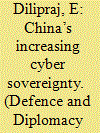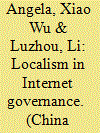|
|
|
Sort Order |
|
|
|
Items / Page
|
|
|
|
|
|
|
| Srl | Item |
| 1 |
ID:
187022


|
|
|
|
|
| Summary/Abstract |
China’s cyber norm-building efforts can be usefully explored based on the concept of the norm life cycle developed by Finnemore and Sikkink. Although China puts cyber sovereignty and government involvement at the core of its cyber governance approach, its Internet policies are a result of interactions between state agencies and business units, and recent reforms suggest greater involvement of Chinese companies. Moreover, many countries, including some from the West, have placed increasing emphasis on intergovernmental involvement and data sovereignty when developing their Internet policies. The EU, for instance, believes that digital sovereignty is necessary to protect its own market from US and Chinese technology giants. Despite the fundamental differences between Brussels's digital sovereignty and Beijing’s cyber sovereignty, the dichotomy between China’s sovereignty-oriented approach and the more open approach of Western countries is more blurred than it may appear, leading to Western countries, the EU in particular, potentially becoming more receptive to China’s cyber norms.
|
|
|
|
|
|
|
|
|
|
|
|
|
|
|
|
| 2 |
ID:
170797


|
|
|
| 3 |
ID:
186853


|
|
|
|
|
| Summary/Abstract |
Often analysing ‘the Chinese Internet’ as a national entity, existing research has overlooked China's provincially oriented web portals, which have supplied information and entertainment to substantial user populations. Through the lenses of the critical political economy of media and critical media industry studies, this article traces the ascendance of China's provincial web from the late 1990s to the early 2000s by analysing industry yearbooks, official reports, conference records, personal memoirs, archived webpages, and user traffic data. We uncover interactions between Internet service providers, legacy media organizations, commercial Internet companies, and the central and local governments – each driven by discrete economic interests, political concerns, and imaginaries about the new technology. Delineating the emergence and consolidation of China's provincial web, our study foregrounds the understudied political economy of online content regionalization at scale. Further, it sheds new light on Chinese media policy, Internet governance, and Internet histories, especially the widely noted conservative turn of online cultures after the mid-2010s.
|
|
|
|
|
|
|
|
|
|
|
|
|
|
|
|
|
|
|
|
|